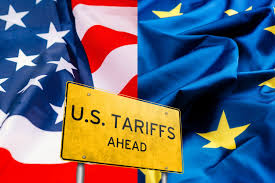The impact of U.S. tariffs on European defense spending is becoming a serious concern, especially as European nations try to balance economic recovery with rising global security threats. Barclays CEO C.S. Venkatakrishnan recently spoke about the pressure these trade policies are putting on the European Union.
European Nations Struggle with the Impact of U.S. Tariffs on European Defense Spending
In a recent interview with CNBC, Barclays CEO highlighted that Europe is facing a “real challenge” due to Washington’s protectionist trade policies. The U.S. has imposed a 25% import tariff on key European products like steel, aluminum, and automobiles. On top of that, an additional 20% “reciprocal” tariff was added in April under the U.S. administration’s broader trade agenda. Though this extra duty was temporarily lowered to 10% during a 90-day negotiation period, it is set to expire in July.
This uncertainty is making it harder for the European Union to plan its financial future especially when it comes to raising funds for defense under the “ReArm Europe Plan.”
Tariffs Create Uncertainty for Business and Economic Growth
As the impact of U.S. tariffs on European defense spending continues to grow, companies across Europe are struggling to understand how these policies will affect their business models. Venkatakrishnan noted that several businesses have pulled back their financial forecasts because of the unpredictable regulatory environment.
He pointed out that industries hit hardest by tariffs may eventually look at options like consolidation or changing their operations altogether. While some businesses are expanding during this relative calm, others remain hesitant due to the ongoing risks.
Europe Needs Fiscal Space to Invest in Defense
For Europe, the challenge lies in finding enough fiscal space to support both economic recovery and increased defense spending. According to the Barclays chief, this would require not just policy changes but also structural reforms, including the possible consolidation of financial institutions within the European market.
The impact of U.S. tariffs on European defense spending goes beyond just trade numbers it’s affecting Europe’s ability to prepare for geopolitical threats and fulfill its security commitments.
Barclays and the Broader Global Picture
Barclays has a strong presence in the United States since its acquisition of Lehman Brothers’ investment banking business in 2008. Now, the bank is watching closely as Europe and the U.S. continue their trade talks.
The UK recently made progress on a new trade deal with the US and a new cooperation with the EU after leaving the EU in 2020. However, the British government is still beset by internal problems including inflation and possible tax revisions. Venkatakrishnan, a supporter of U.K. Finance Minister Rachel Reeves, said that consumer behavior remains steady but cautious, with many managing their finances carefully in response to rising costs.
Inflation and Economic Growth Remain at the Forefront
People across Europe and the U.K. are increasingly concerned about rising costs from energy bills to inflation driven by tariffs. According to Venkatakrishnan, the only sustainable answer to these problems is long-term economic growth. While consumers are holding up well for now, the road ahead requires smart policies and effective trade negotiations.
Conclusion: A Call for Strategic Reforms in Light of the Impact of U.S. Tariffs on European Defense Spending
U.S. tariffs have a strategic influence on European defence investment in addition to being an economic one. Europe must manage intricate trade connections with the United States while attempting to fortify its financial and military stability. In a world that is becoming more unpredictable, business executives like Venkatakrishnan are pleading with legislators to allow for both expansion and defence.
For more such news, stay updated with 10X Times News.






